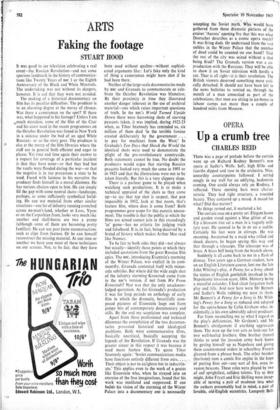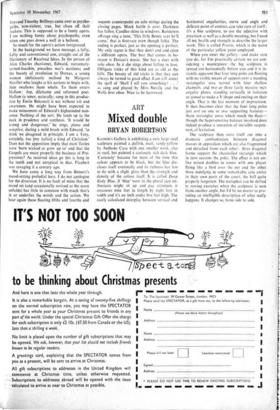Up a crumb tree
OPERA • CHARLES 'REID
There was a page of prelude before the curtain went up on Richard Rodney Bennett's new opera at Sadler's Wells. Soft, high fifths and fourths dipped and rose in the orchestra. Nice, unearthly ,counterpoints followed. I settled snugly in my stall for an edifying, hedonistic evening. One could always rely on Rodney, I reflected. These opening bars were charac- teristic. They had tight structure, a rounded beauty. They conjured up a mood. A mood for what? Did that matter?
As things turned out, it mattered a lot.
The curtain rose on a pretty set. Elegant house and garden stood against a, blue glitter of sea. Up a blossom tree sat a man in 'a vaguely mili- tary coat. He seemed to be in or on a saddle. Certainly his feet were in stirrups. He was snoozing. Awakened by a maid who trilled and shook dusters, he began spying this way and that through a telescope. The telescope was of brass. A brass bell hung from the branch above.
Suddenly it all came back to me in a flash of dismay. Two years ago a German student, here on an English Literature course, lent me the late John Whiting's play, A Penny for a Song, about the tizzies of English gentlefolk involved in the Napoleonic invasion scare, 1804. Memory being a merciful colander, I had clean forgotten both play and title. And now here were Mr Bennett and Sadler's Wells rubbing my nose in them. Mr Bennett's A Penny for a Song is Mr Whit- ing's Penny for a Song as reduced and adapted for the opera-house by Colin Graham who, in- cidentally, is his own admirably adroit producer.
Far from reconciling me to what I regard as the play's deficiencies, Mr Graham's and Mr Bennett's abridgement if anything aggravates them. The man up the tree acts as look-out for two well-heeled brothers. One brother (tenor) thinks to send the invasion army back home by getting himself up as Napoleon and giving them countermand orders in schoolboy French gleaned from a phrase book. The other brother (baritone) runs a comic fire engine in the hope of putting fires out—any sort of fire, even in- vasion beacons. These roles were played by two of ouF sprightliest, solidest talents. Try as they might, John Fryatt and Eric Shilling were incap- able of turning a pair of madmen into what the authors presumably had in mind, a pair of lovable, old-English eccentrics. Lamprett Bell- boys and Timothy Bellboys came over as psycho- paths, non-violent, true, but clean off their rockers. This is supposed to be a funny opera. I see nothing funny about psychopaths, eVen when one goes down a well in a balloon.
So much for the opera's action foreground.
In the background we have message, a lofty, Lefty and conventional one, straight out of the Dictionary of Received Ideas. In the person of Alan Charles (baritone), Edward, mercenary- turned-Jacobin, preaches war's nastiness and the beauty of revolution to Dorcas, a young woman (deliciously realised by Margaret Neville) who laughs at his notions to begin with, then swallows them whole. To them enters Hallam: fop, dilettante and reformed poet. Hallam (a tenor, naturally; sung in this produc- tion by Emile Belcourt) is not without wit and awareness. He might have been expected to make mincement of Edward's highminded non- sense. Nothing of the sort. He lands up to the neck in prudence and synthesis. 'It would be wrong and dangerous,' he sings, piano and semplice, during a mild brush with Edward, 'to think we disagreed in principle. I am a Tory, certainly, but [my italics] a kind of Christian.' Does not the apposition imply that most Tories were 'born wicked or grew up so' and that the Gospels are more properly the business of Pro- gressives? As received ideas go this is long in the tooth and not untypical in that. Flaubert was savaging it a century ago.
We have come a long way from Bennett's mood-setting preludial bars. I do not apologise for the diversion. It is no fault of mine that the mood set (and occasionally revived as the score unfolds) has little in common with much that's in or underlies the words and the action. We hear again those floating fifths and fourths and
serpent counterpoint on solo strings during the closing pages. Mock battle is over. Darkness has fallen. Candles shine in windows. Roisterers offstage sing a tune, 'This little Roney says he'll come,' that is first-rate even though folky. The ending is perfect, just as the opening is perfect. My only regret is that they don't end and open a different opera. The best that comes in be- tween is Dorcas's music. She has a duet with solo oboe. In it she sings about falling in love. Obligato tricks of this kind are as old as the hills. The beauty of old tricks is that they can always be turned to good effect. I am still under the spell of 'Shall I tell you something? . .
as sung and played by Miss Neville and the Wells first oboe. Nice to be harrowed.







































 Previous page
Previous page